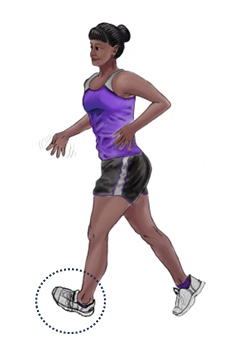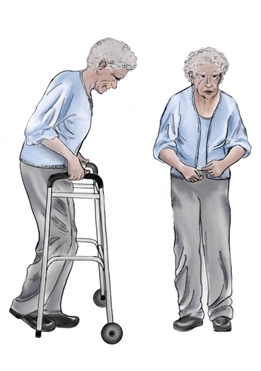Parkinson's disease
(Redirected from Paralysis agitans)
Editor-In-Chief: Prab R Tumpati, MD
Obesity, Sleep & Internal medicine
Founder, WikiMD Wellnesspedia &
W8MD medical weight loss NYC and sleep center NYC
| Parkinson's disease | |
|---|---|
| File:Paralysis agitans (1907, after St. Leger).png | |
| Synonyms | N/A |
| Pronounce | N/A |
| Specialty | N/A |
| Symptoms | Tremor, rigidity, bradykinesia, postural instability |
| Complications | N/A |
| Onset | Typically after age 60 |
| Duration | Long term |
| Types | N/A |
| Causes | Unknown, believed to involve genetics and environmental factors |
| Risks | Ageing, family history, male gender |
| Diagnosis | Based on medical history and neurological examination |
| Differential diagnosis | Essential tremor, dementia with Lewy bodies, multiple system atrophy |
| Prevention | N/A |
| Treatment | Levodopa, dopamine agonists, deep brain stimulation |
| Medication | N/A |
| Prognosis | Progressive, with variable rate of progression |
| Frequency | 6.1 million globally (2016) |
| Deaths | N/A |
Parkinson's disease (PD) is a long-term degenerative disorder of the central nervous system. Its main effects are on the motor system, but as the disease progresses, non-motor symptoms become common. Although the exact cause is unknown, both genetic and environmental factors are believed to play a role.
Classification[edit | edit source]
PD is primarily classified as a movement disorder. It falls under the broader category of Parkinsonian syndromes, which comprises disorders exhibiting similar symptoms but with distinct causes.
Signs and Symptoms[edit | edit source]
Motor[edit | edit source]
- Tremor: Often starts in a limb, especially the hand or fingers. This is sometimes referred to as "resting tremor."
- Bradykinesia: The slowing down and loss of spontaneous and automatic movement.
- Rigidity: Muscle stiffness that occurs in any part of the body.
- Postural instability: Balance problems, leading to falls.
Neuropsychiatric[edit | edit source]
- Cognitive decline: Including slowed thinking, difficulties with reasoning, and memory issues.
- Mood disorders: Such as depression and anxiety.
- Apathy: A general lack of enthusiasm or motivation.
- Hallucinations and Delusions: Particularly visual hallucinations.
Other[edit | edit source]
- Sleep disturbances and disorders
- Speech changes and difficulties
- Problems with swallowing
- Constipation
- Urinary problems
- Reduced or loss of sense of smell
Causes[edit | edit source]
Environmental Factors[edit | edit source]
- Exposure to certain toxins and chemicals, notably pesticides, has been linked with a heightened risk of developing PD.
- Head injuries and trauma have also been considered potential risk factors.
Genetics[edit | edit source]
While the majority of PD cases are idiopathic (of unknown cause), certain genetic mutations have been identified that can increase the risk, especially in familial cases of PD.
Pathophysiology[edit | edit source]
Brain Cell Death[edit | edit source]
The primary pathological characteristic of PD is the loss of dopamine-producing neurons in the substantia nigra. This loss leads to a deficiency of the neurotransmitter dopamine, critical for coordinating smooth and balanced muscle movement.
Diagnosis[edit | edit source]
Imaging[edit | edit source]
Neuroimaging techniques, such as MRI and PET scans, can help rule out other disorders but are not diagnostic for PD.
Differential Diagnosis[edit | edit source]
Conditions such as multiple system atrophy, progressive supranuclear palsy, and drug-induced parkinsonism can produce symptoms similar to PD.
Prevention[edit | edit source]
Currently, there's no sure way to prevent PD. However, some data suggest that caffeine consumption, regular aerobic exercise, and avoidance of certain environmental toxins might reduce the risk.
Management[edit | edit source]
Medications[edit | edit source]
- Levodopa (often combined with carbidopa)
- Dopamine agonists
- MAO-B inhibitors
- Anticholinergics
Surgery[edit | edit source]
Deep brain stimulation (DBS) is the primary surgical treatment, especially for patients who no longer respond adequately to medications.
Rehabilitation[edit | edit source]
Physical, occupational, and speech therapies can all be beneficial for PD patients to manage their symptoms better.
Palliative Care[edit | edit source]
This form of care is aimed at improving the overall quality of life for patients with advanced PD and their families.
Prognosis[edit | edit source]
PD is a progressive disorder, with symptoms typically worsening over time.
Epidemiology[edit | edit source]
PD is most commonly diagnosed in individuals over the age of 60. The incidence is slightly higher in men than in women.
History[edit | edit source]
PD is named after the English doctor James Parkinson, who published the first detailed description in An Essay on the Shaking Palsy in 1817.
Society and Culture[edit | edit source]
Cost[edit | edit source]
The financial burden of PD is significant, encompassing medical and non-medical expenses. Direct costs include hospitalizations, doctor visits, and medications, while indirect costs might involve lost wages, early retirement, or modifications to a home.
Advocacy[edit | edit source]
Numerous organizations around the world, like the Parkinson's Foundation and Michael J. Fox Foundation, advocate for better research, care, and awareness of PD. These bodies often lead initiatives for fundraising, support groups, and educational events.
Notable Cases[edit | edit source]
- Muhammad Ali, the renowned boxer, was diagnosed with Parkinson's in 1984.
- Actor Michael J. Fox was diagnosed with early-onset Parkinson's in 1991 and has since become a significant advocate for research and awareness.
Research[edit | edit source]
Animal Models[edit | edit source]
Several animal models, particularly rodents and primates, have been developed to study PD. They help in understanding the disease progression and in testing potential treatments.
Gene Therapy[edit | edit source]
Gene therapy aims to replace or augment the function of an aberrant gene or to modulate the expression of a gene. In the context of PD, research is ongoing to assess the viability of this approach.
Neuroprotective Treatments[edit | edit source]
Researchers are exploring drugs that could protect dopamine-producing neurons from damage, potentially halting the progression of the disease.
Cell-Based Therapies[edit | edit source]
Stem cells and other cell-based therapies are being investigated for their potential to replace lost neurons in PD patients.
Epidemiology[edit | edit source]
PD is a global disease, affecting all ethnicities and cultures. Its prevalence increases with age, and as global populations grow older, the number of PD cases is expected to rise.
History[edit | edit source]
Beyond James Parkinson's initial discovery, there's a long history of research and discoveries in the realm of PD. The 20th century saw significant advancements in understanding the disease's biochemistry and introducing levodopa as a treatment.
The protein alpha-synuclein aggregates into Lewy bodies and neurites
| This article is a medical stub. You can help WikiMD by expanding it! | |
|---|---|
| Diseases of the nervous system, primarily CNS (G04–G47, 323–349) | ||||||||||||||||||||
|---|---|---|---|---|---|---|---|---|---|---|---|---|---|---|---|---|---|---|---|---|
|
| Antiparkinson agents (N04) | ||||||||||||||||||
|---|---|---|---|---|---|---|---|---|---|---|---|---|---|---|---|---|---|---|
|
Transform your life with W8MD's budget GLP1 injections from $125
W8MD offers a medical weight loss program NYC and a clinic to lose weight in Philadelphia. Our W8MD's physician supervised medical weight loss centers in NYC provides expert medical guidance, and offers telemedicine options for convenience.
Why choose W8MD?
- Comprehensive care with FDA-approved weight loss medications including:
- loss injections in NYC both generic and brand names:
- weight loss medications including Phentermine, Qsymia, Diethylpropion etc.
- Accept most insurances for visits or discounted self pay cost.
- Generic weight loss injections starting from just $125.00 for the starting dose
- In person weight loss NYC and telemedicine medical weight loss options in New York city available
- Budget GLP1 weight loss injections in NYC starting from $125.00 biweekly with insurance!
Book Your Appointment
Start your NYC weight loss journey today at our NYC medical weight loss, and Philadelphia medical weight loss Call (718)946-5500 for NY and 215 676 2334 for PA
Search WikiMD
Ad.Tired of being Overweight? Try W8MD's NYC physician weight loss.
Semaglutide (Ozempic / Wegovy and Tirzepatide (Mounjaro / Zepbound) available. Call 718 946 5500.
Advertise on WikiMD
|
WikiMD's Wellness Encyclopedia |
| Let Food Be Thy Medicine Medicine Thy Food - Hippocrates |
Translate this page: - East Asian
中文,
日本,
한국어,
South Asian
हिन्दी,
தமிழ்,
తెలుగు,
Urdu,
ಕನ್ನಡ,
Southeast Asian
Indonesian,
Vietnamese,
Thai,
မြန်မာဘာသာ,
বাংলা
European
español,
Deutsch,
français,
Greek,
português do Brasil,
polski,
română,
русский,
Nederlands,
norsk,
svenska,
suomi,
Italian
Middle Eastern & African
عربى,
Turkish,
Persian,
Hebrew,
Afrikaans,
isiZulu,
Kiswahili,
Other
Bulgarian,
Hungarian,
Czech,
Swedish,
മലയാളം,
मराठी,
ਪੰਜਾਬੀ,
ગુજરાતી,
Portuguese,
Ukrainian
Medical Disclaimer: WikiMD is not a substitute for professional medical advice. The information on WikiMD is provided as an information resource only, may be incorrect, outdated or misleading, and is not to be used or relied on for any diagnostic or treatment purposes. Please consult your health care provider before making any healthcare decisions or for guidance about a specific medical condition. WikiMD expressly disclaims responsibility, and shall have no liability, for any damages, loss, injury, or liability whatsoever suffered as a result of your reliance on the information contained in this site. By visiting this site you agree to the foregoing terms and conditions, which may from time to time be changed or supplemented by WikiMD. If you do not agree to the foregoing terms and conditions, you should not enter or use this site. See full disclaimer.
Credits:Most images are courtesy of Wikimedia commons, and templates, categories Wikipedia, licensed under CC BY SA or similar.
Contributors: Prab R. Tumpati, MD





















